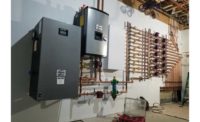Some HVAC contractors weighed in with tips that will prevent a lot of unnecessary chiller service or replacement. Darin Fackler, service manager for Hill York Service of Melbourne, Fla., calls good maintenance “predictive maintenance” and noted that it is the “next movement in maintenance technology.”
Fackler said, “This maintenance includes diagnostics like vibration analysis, infrared thermography, and rotor bar testing. Techniques such as these can help to determine the condition of in-service equipment in order to predict when maintenance should be performed.”
Good Old-Fashioned Maintenance
Fackler pointed out that despite the new maintenance technology, preventive maintenance plans “remain the key to ensuring the best performance and efficiency of a chiller.”
Antonio Perez, vice president of service operations for Weathertrol Maintenance, Miami, has many years of experience in the HVAC service industry and said that the greatest trap techs fall into is shortchanging the importance of proper maintenance and recordkeeping on a piece of machinery, especially a chiller. Perez speaks from experience. Weathertrol Maintenance currently has over 320 chillers under contract, covering the “full spectrum of manufacturers and designs,” he said. “These are found in high-exposure facilities such as schools, airports, hospitals, museums, office buildings, hotels, and emergency response buildings.”
Based on his experience, Perez concluded that there is one very important check or test that should be done at a minimum of once a year, preferably twice a year. “This is an oil analysis test,” he said. “The information that this test can give you is priceless. It provides us with not only a benchmark from which to begin monitoring once we pick up a new chiller under contract, but it also gives us some insight of the current internal conditions of a particular machine.”
Scott Doria, commercial account manager for Edd Helms Air Conditioning & Electric, Miami, said that a key to proper chiller maintenance begins with one simple task: observation.
“Before any chiller work is started, the service technician should always observe and record the chiller’s operating conditions for a few minutes prior to making any adjustments or repairs, unless the chiller is offline or shut down,” Doria said. “Those operating conditions include such things as CHW [chilled water] and CW [condenser water], in and out temperatures, refrigerant temperatures, percentage of motor RLA [running load amps], approach, and pressure drop through the chiller if it is running.
“Observing and recording these conditions have always allowed me to get a typical snapshot of what is going on with the chiller before making any adjustments or repairs.”
Five Essentials
Fackler said that in addition to preventive maintenance, there are five essential elements to properly maintaining chillers.
“First, maintain a daily operating log,” he said. “Chiller operators should document chiller performance daily with an accurate and detailed log, comparing this performance with design and startup data to detect problems or inefficient control setpoints.
“Second, perform an oil and refrigerant analysis. Annual chemical analysis of oil and refrigerant can aid in detecting chiller contamination problems before they become serious issues. Technicians should take an oil sample while the chiller is operating. The oil should be changed only if indicated by oil analysis.
“Third, keep evaporator and condenser tubes clean. One large potential drawback to desired chiller performance is heat-transfer efficiency. Chiller performance and efficiency relate directly to its ability to transfer heat, which begins with clean evaporator and condenser tubes.
“Fourth, ensure a leak-free unit. Once in the chiller, noncondensables become trapped in the condenser, increasing condensing pressure and compressor-power requirements and reducing efficiency and overall cooling capacity. Leaks can result in a low refrigerant charge and the potential for greater operational losses.
“Fifth, maintain proper water treatment. Most chillers use water for heat transfer, so the water must be properly treated to prevent scale, corrosion, and biological growth. Working with a reputable water treatment vendor who can provide full service to all of your facility water systems is key.”
Perez said that using information from tasks such as an oil analysis can help prevent additional damage that can lead to major catastrophic failures when neglected or ignored. “As the old Fram Oil commercial slogan brought to light many years ago, ‘You can pay me now or pay me later,’” he said. “In this very competitive industry, the edge is found in being committed to preventive maintenance.”
Publication date: 05/07/2012










